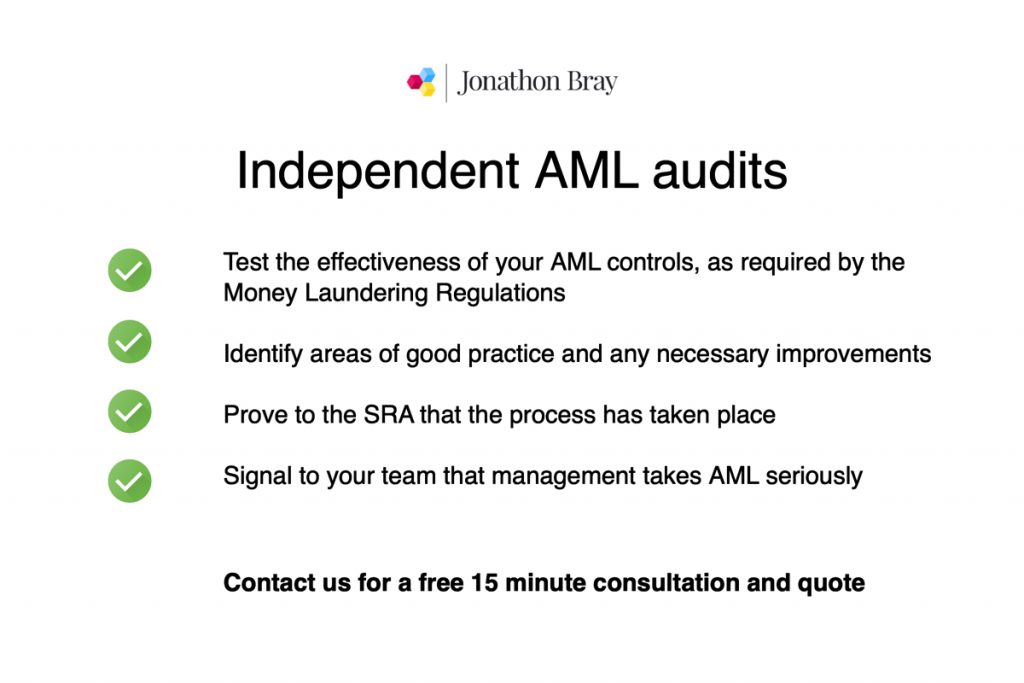Getting personal: SRA fines law firm employee for not following AML policy
Do you find it difficult to get your team to follow your AML policy and procedures? Do the words ‘head’ and ‘brick wall’ spring to mind?
Perhaps you should direct them to this case, which resulted in a £3,500 fine for a legal executive conveyancer who didn’t ‘adequately’ establish the source of funds on a couple of property transactions.
The SRA noted that this was contrary to the firm’s AML policies, controls and procedures.
There was no suggestion that this was a pattern of behaviour, or that the transactions resulted in actual financial crime. It was enough that a ‘wilful disregard of her regulatory obligations…had the potential to cause harm to others’.
Anyone who has direct responsibility for the cases they handle faces similar exposure.
Criminal Finances Act 2017 – a reminder for law firms
If anti-money laundering and sanctions compliance are in the spotlight right now, spare a thought for the Criminal Finances Act 2017. A shy, overshadowed piece of legislation that desperately craves your compliance department’s attention.
In this post we look at:
- The scope of the Criminal Finances Act 2017
- Definitions of ‘facilitation of tax evasion’ and ‘associated person’
- Compliance controls you might consider putting in place
ICYMI: Don’t be tempted by this common delay tactic – it will get you struck off
Three solicitors have been struck off in quick succession for strikingly similar offences: misleading their clients about the progress of their case.
Andrew Mark Brett ‘repeatedly’ misled a client over the progress of professional negligence litigation. He pretended that court proceedings and hearings were in progress, knowing that not to be the case. The client’s claim was eventually struck out due to the solicitor’s inaction.
Lesley Wilkinson was similarly struck off for misleading clients about their personal injury cases. Over a three year period, the solicitor strung the clients along when she knew the cases had been struck out. The clients were only alerted when bailiffs appeared to enforce a costs order against them.
Albert Saul Bargery was struck off for forging a court order and email to cover lack of progress on a low value Japanese knotweed case. When the client complained about slow progress, the solicitor (presumably to buy some time) produced a fabricated order purporting to compensate the client. When the client chased for his damages, the solicitor compounded the lie by producing a falsified email showing that he had chased the other side for payment.
In this post, we look at the principals involves and what drives solicitors to make poor ethical decisions.
What can law firms do about it?
News and Guidance

SRA Updates
- Report: Quality indicators in legal services pilot project – The year-long pilot project involving legal regulators and comparison sites has finally reported back. The main findings were:
- The public found digital reviews and comparison sites for legal services helpful, and are increasingly willing to use them – 22% of clients currently use these tools
- Many firms engage with review sites, although there are concerns about the reliability of reviews
- Very few firms engage with price comparison sites, many fearing a ‘race to the bottom’ and lack of context on fees
- Barriers to broader adoption include:
- lack of awareness
- low number of firms engaging with the comparison sites
- the complexity of professional services compared to products and consumer services
- people do not generally instruct lawyers regularly
Whether or not legal regulators should be undertaking this work, at the expense of the profession, is a different question.
There is a strong argument that law firms’ decision to use digital comparison tools is entirely a commercial one. If there are indeed ‘clear benefits’ to both lawyer and client, then the market will dictate that adoption of comparison tools will increase with or without the SRA’s help.
Meddling in a free market and cosying up to digital referral companies goes beyond the remit of public protection.
However, that appears to be a lost argument. Ever since the Competition and Markets Authority 2016 report, there has been pressure on the front line regulators to increase competition. The Legal Services Board, the oversight regulator which seems to place ‘promoting competition’ ahead of the other regulatory objectives in the Legal Services Act 2007, will enthusiastically push this agenda.
We can expect more of the same. The Transparency Rules will almost certainly widen in scope.
- Firms asked to check turnover information – lots of firms are being asked to confirm the SRA is working off the correct turnover calculate their practising fees.
Law Society Updates (may require login)
- Gazette news focus: SDT draws a line on sexual misconduct – A useful summary of the high-profile Bretherton case, which concluded with the strike-off of a senior solicitor for a catalogue of intimate and explicit messages to a teenage colleague, along with unwanted advances made towards two other complainants. It is an uncomfortable case that appears to fit into the ‘abuse of power’ category of sexual misconduct that the SRA is so concerned about. Future prosecutions will no doubt be measured against this one.
- Tools: High risk third countries for AML purposes – Check the latest updates to those countries that must always be treated as high risk. But don’t forget – just because a country does not appear on the official list does not mean it should be treated as low risk.
Other Updates
- Russia (Sanctions) (EU Exit) (Amendment) (No 2) Regulations 2023, SI 2023/665 – In force from 20 June 2023, this SI extends the scope of certain sanctions to remain in place until Ukraine is compensated by Russia.
Free webinars

Register Now: Optimising your AML knowledge to ensure you are LSAG compliant
We are delighted to be co-hosting this session with our friends at Thirdfort.
Unsurprisingly, we get asked many questions about source of funds, source of wealth, identification of clients, and the like. In the current world of regulation, we find many law firms are very nervous about ‘getting it wrong’ and want to ensure compliance.
In this webinar, our JBL team will be discussing some of these most common compliance queries with input from Thirdfort.
We will look at the following:
- Source of funds – how far do we need to go? How do I know I’m done?
- Source of funds – is the ‘Bank of Mum and Dad’ low risk?
- Source of wealth – can I take my client’s word for it?
- Risk assessment – do I need to do one at the start of every file?
- Ongoing monitoring – what should this look like in practice?
- Employee screening – we don’t DBS-check all our staff. Should we?
- Independent audit – how often does it need to be done?
- CDD – do I need to verify the identity of all the Directors of a client company?
- CDD – who do I need to verify in a trust?
So come and join us and let us guide you through this maze. And of course, you will have the opportunity to ask any of your burning questions.
Invitations and registration link to follow for clients and newsletter subscribers.
Date and time: 12:00pm on 28 June 2023 via Zoom
Last session: ‘Ask us anything!’ – watch the recording
Last month’s live webinar was slightly less structured than usual, as the team tackled your burning compliance and AML-related questions.
Topic covered included:
- E-verification tools and how often firms should revisit CDD
- How to end a client relationship
- Outsourcing client onboarding to a central team
- How and when to establish Source of Funds
- How often an independent AML audit is required
- How to update interest policies and the de minimis amount
- Who can sign off qualifying work experience under the SQE
- Submitting DAMLs and SARs to the National Crime Agency
Recording: Click here and use passcode 3rJ+fh1^ (available for 14 days)
SRA and SDT disciplinary decisions

- James Alexander Howard – struck off for dishonestly claiming that almost £200,000 had gone missing from his personal bank account, creating false documentation to evidence the lie over the course of a year. Although the misconduct was not directly linked to his professional life, the fact that the dishonesty was planned and sustained “clearly fell within the regulator’s remit“.
- Alex Richard Guy – struck off for overcharging vulnerable clients, including bills for work as a deputy that was never done amounting to over £250,000.
- SRA to pay £38,000 costs after rebuke overturned
- Andrew Hutchinson – rebuked for continuing to practise whilst bankrupt.
- Peter John Smith – fined £7,501 for using the client account as a banking facility, by making utilities and other expenses on behalf of long standing overseas clients.
- Paul Levy – fined £5,000 for an improper transfer from client to office account (circa £3,000), in breach of the Accounts Rules.
- Adam Godwin Herbert – fined £3,400 for second drink driving conviction.
- Daniel David Pipe – struck off following conviction for attempted sexual communication with a child, caught as part of a dating app ‘sting’ operation by the police.
- Shamikh Mustasum – fined £2,975 for failing to keep proper books of account, in breach of the Accounts Rules.
- Rebecca Claire Heseltine – legal executive fined £3,500 for failing to follow her firm’s AML procedures; specifically not establishing source of funds in two residential conveyancing transactions. In doing so she ‘showed a wilful disregard of her regulatory obligations...[with] the potential to cause harm to others.’










